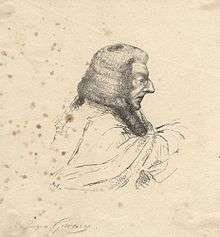John Gurney (judge)
| Sir John Gurney KC | |
|---|---|
 | |
| Baron of the Exchequer | |
|
In office 13 February 1832 – January 1845 | |
| Preceded by | Sir William Garrow |
| Personal details | |
| Born |
14 February 1768 London |
| Died |
1 March 1845 (aged 77) Lincoln's Inn Fields |
| Nationality | British |
| Spouse(s) | Maria Hawes |
| Relations |
Joseph Gurney (father) Thomas Gurney (grandfather) William Brodie Gurney (brother) |
| Children |
John Hampden Gurney Russell Gurney |
| Profession | Barrister, Judge |
Sir John Gurney KC (14 February 1768 – 1 March 1845) was a British barrister and judge. Born into a family of noted stenographers, he was educated at St Paul's School and was called to the Bar by the Inner Temple on 3 May 1793. After distinguishing himself in a libel trial, Gurney became junior counsel in a variety of state trials during the 1790s. After several more noted cases during the early 19th century, he was knighted and made a Baron of the Exchequer on 13 February 1832, a position he gave up in 1845 due to ill-health, dying the same year.
Early life and career
Gurney was born in London on 14 February 1768 into a noted family of stenographers, including Joseph Gurney (his father), William Brodie Gurney (his brother) and Thomas Gurney (his grandfather). He was educated at St Paul's School and then by Reverend Smith in Suffolk, and accompanying his father to court developed a love of the law. As a result, he was called to the Bar by the Inner Temple on 3 May 1793. Two months after qualifying as a barrister he was hired as junior counsel to defend Daniel Isaac Eaton for libel, and after his senior failed to turn up, ran the case himself. He was such a success that he was hired as junior counsel during the trials of Thomas Hardy and John Horne Tooke for treason.[1]
Gurney later defended Robert Thomas Crossfield for complicity in the popgun plot, and then prosecuted Lord Cochrane for spreading rumours of Napoleon's death to make money on the stock exchange. As a result of this case and his prosecution of the Cato Street conspirators in 1820 he was made a King's Counsel, and on 13 February 1832 was knighted and made a Baron of the Exchequer. In November 1835 he became the last judge in England to sentence two men to be hanged for sodomy under section 11 of the Offences against the Person Act 1828 which had replaced the Buggery Act 1533.[2]
Gurney was noted as an independent, albeit harsh judge, and held the position for over a decade until he was forced to resign in January 1845 due to ill health, dying two months later on 1 March 1845.[3]
He is buried in a large sarcophagus-form grave in Old St Pancras Churchyard in London, to the east side of the church, south of the distinctive monument to Sir John Soane, and he is listed on the Burdett-Coutts Memorial Sundial.
References
- ↑ Foss 1870, p. 318.
- ↑ Old Bailey Proceedings Online (www.oldbaileyonline.org, version 7.0, 08 March 2013), September 1835 (t18350921)
- ↑ Hamilton, J.A. (2004). "Oxford DNB article: Gurney, Sir John (subscription needed)". Oxford University Press. Retrieved 7 January 2010.
